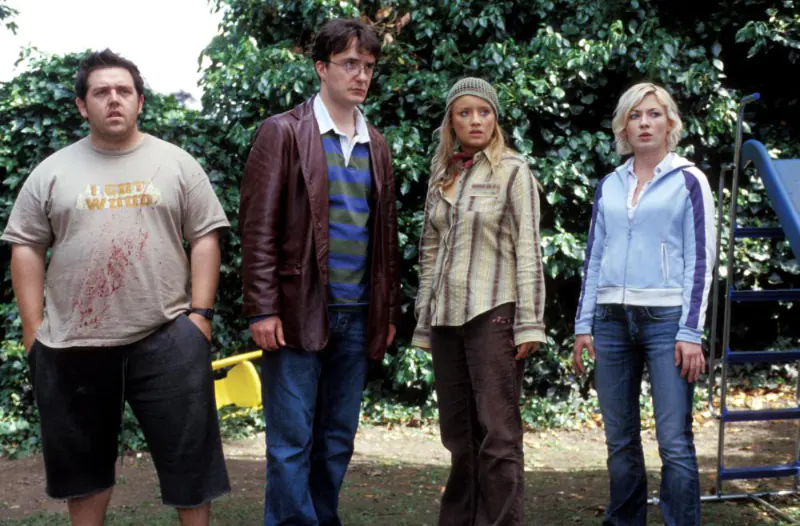Edgar Wright's Modern Zombie Classic
I totally love Shaun Of The Dead. It's a great horror spoof, and a bloody great movie. Zombies have formed their own, sub-genre since White Zombie (1932), and they’re still going strong. However, they rarely cross over into mainstream territory, and this is what made Shaun Of The Dead special.
Shaun is a classic that defies pigeonholing, and it transcends style. It satisfies the staunchest fan of the genre, as well as those who are unfamiliar with the movies of George A. Romero, easily the most revered zombie writer/director in cinema history.
Apparently Romero was so impressed with Shaun that he asked filmmakers Simon Pegg and Edgar Wright to appear for zombie cameos in Land of the Dead (2005), the fourth part in Romero's Dead series.
MAKING ZOMBIES GO VIRAL
The story is simple and linear, as the IMDB logline confirms: “A man decides to turn his moribund life around by winning back his ex-girlfriend, reconciling his relationship with his mother, and dealing with an entire community that has returned from the dead to eat the living.” There is a clear goal (or several), high stakes, and a relevant theme.
A logline like this promises a well-structured, easily-remembered story, and this is exactly what Shaun Of The Dead delivers. Filmmakers tend to underestimate the value of a simple logline, reflecting a clear structure. They think it makes the film feel predictable, or it dumbs things down.
You know why a short, crystal-clear logline is so important? It makes word of mouth a piece of cake. After seeing the movie, my 12-year old could summarise the essence of the story in one sentence. That’s how successful movie marketing works.
Don’t get me wrong: you still need to deliver a brilliant movie. But the masses will do the viral campaigning for you.
DEATH BY SLACKERS
Shaun impersonates the perfect transformational character, forced to go on a mission that would be impossible for his normal self.
Early in the story, his girlfriend Liz paints the picture of where he is going with his life: "Look, if I don’t do something, I’m gonna end up in that pub every night for the rest of my life like those other sad old fuckers, drinking myself to death wondering what the hell happened."
Shaun needs to grow up, let go of the friend who enables his immaturity, and settle with Liz… if he doesn’t want to lose her. In a mythological sense, he will also need to kill his father, so he can enter the realm of masculine adulthood. And all the while, he is metaphorically surrounded by the threat of death by slackers.
The first act runs for about 35 minutes, yet it doesn’t drag. The zombie outbreak gives it tension, and the Wright/Pegg dialogue and editing gives it pace. As a result, the shortish second act feels nice and tight, too.

THE WRIGHT STYLE
In the scene/sequence that concludes Act One, Shaun gives us an exact rundown of what he needs to achieve in the movie. It could be a rehearsal for the movie's pitch, edited in the signature snappy Edgar Wright style. But before we get to this sequence, Ed calls into the phone: “We’re coming to get you, Barbara!”
The irony is that George A. Romero, who was given a private viewing of the film, was oblivious to the fact that this line was copied literally from his own film Night of the Living Dead (1968). He only found out later after a phone conversation with Wright.
What follows is fabulous storytelling. We first see the events as they should happen, but with each next version, Shaun shows an increasingly flawed response to the various calls to adventure. On the last shot of the sequence, we know where the story really should not, but might well end: the Winchester.
Karel Segers
Karel Segers wrote his first produced screenplay at age 17. Today he is a story analyst, script editor and producer with experience in rights acquisition, script development and production. His
screenwriting classes have trained writers in Australia, Europe, Asia and the Middle East, and his clients include international award-winning filmmakers as well as three Academy Award nominees.
Karel is the founder of
The Story Department and he ranks in the world's Top 10 of most influential people for screenwriting on Twitter.